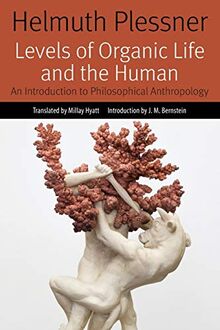
"This twentieth-century work was a pioneering effort to articulate an alternative to mechanistic-reductive accounts of life, and especially human life. Neglected for too long, it is now available to a wider audience in a new climate, where it will have its full impact."-Charles Taylor, Author of A Secular Age
"Outfitted with J. M. Bernstein's orienting Introduction, this book matters not merely for historical reasons, but also because contemporary thought is returning to its premises."-Samuel Moyn, Yale University
"Among twentieth century philosophers Helmuth Plessner stands apart, anticipating key ideas in theoretical biology and cognitive science. His unfairly neglected major work is now available in this fine translation. What a welcome moment for twenty-first century philosophy."-Evan Thompson, author of Waking, Dreaming, Being
"The Levels is Plessner's masterwork. . . . Its new paradigm should be regarded as belonging to the forward edge of contemporary philosophical thought."-J. M. Bernstein, from the Introduction
Now available in English, this key work by a titan of modern thought draws on phenomenological, biological, and social scientific sources in a highly original systematic account of nature, life, and human existence. On Plessner's unique account, living things articulate complex boundary dynamics between their insides and surrounding world, thereby establishing a characteristic "positionality" within an environment. The approach underwrites not only philosophical biology but philosophical anthropology as well, since the "excentric positionality" of humans, by which we take a stand outside our own bodies, holds significant implications for knowledge, culture, religion, and technology.
Initially obscured by the superficially similar views of Max Scheler and Martin Heidegger and by his forced exile during World War II, Plessner's vision has, in recent decades, once again become appreciated, as scholarship has moved more squarely into engagement with animality, human dignity, social theory, and the philosophy of technology and nature.
A powerful and sophisticated account of embodiment, the Levels is not merely a historical monument, but contributes to a range of vital current conversations around the posthumanism, the material turn, and the biology and sociology of cognition. A modern philosophical classic, the Levels helps us undertake philosophy and social theory together with science, without reducing the former to the latter.
Helmuth Plessner (1892-1985) was a German philosopher and sociologist. His Political Anthropology has recently appeared in English.